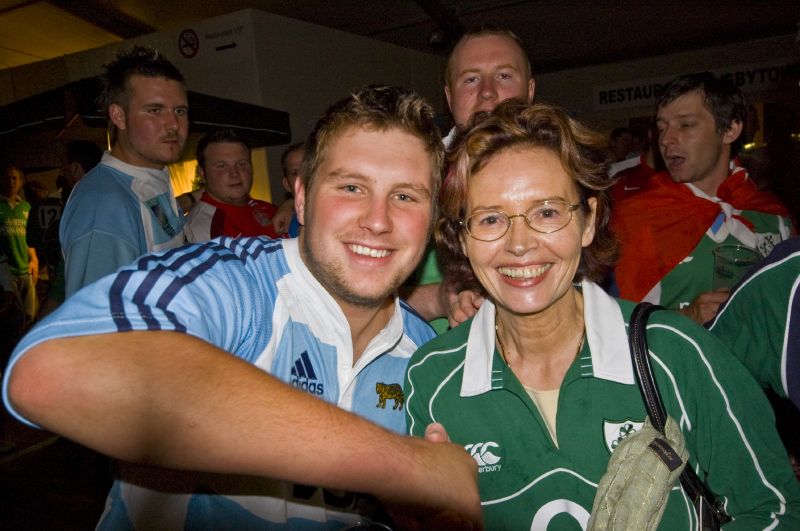Globalsport/Culture Community
Contents
Rugby World Cup: Culture and Community
|
These are the things you should be able to do after you have completed the activities in this strand:
|
How will people be affected by the Rugby World Cup?
|
At the end of this activity you should be able to discuss how and why people might have different opinions about how hosting the Rugby World Cup will affect them and other people who live in New Zealand. |
The New Zealand Government considers the Rugby World Cup 2011 to be a very important event for the country, and has even appointed a Rugby World Cup Minister to help the planning for the tournament to run smoothly. From the starter activities you are already aware that the government has changed the school holidays to cut down traffic flows in the major centres while the knock-out stage of the Rugby World Cup is being played. The event will cause a lot of disruption to people's normal activities during the spring season of 2011. Lots of people have very different ideas about the Rugby World Cup.
Exploring different people's ideas and feelings about the Rugby World Cup
|
You may have found that other people may have similar ideas to your own, or that theirs are actually quite different. That's not a problem because there are no 'right' or 'wrong' ideas about these issues. In the next activity you will need to work in a small group with others from your class. You could work with a group of up to six people. Your teacher may want to put you in a particular group for this activity or you may be able to choose your own group to work with.
Discussing the Rugby World Cup from different viewpointsChoose a person's name from the list below and click on it. The link will take you to a few details of an imaginary character who has an opinion about the Rugby World Cup being held in New Zealand.
Share your thoughts with the others in the group.
|
| James | Nadia | Wiremu | Sam | Rangi | Heather | Dion | Sara | Trevor | Anthea | Kevin | Temepara | Mike | Shona |
| David | Allan | Lydia | Sione | Dannielle | Ben | Olivia | Emily | Laura | George | Darryl | Rimupae | Laura | Peter |
Hearing some other voices...Your teacher may decide to take the discussions different groups have been having and broaden these into a whole class activity.
The key thing to remember is that there are lots of different positions that people can take on an issue.
|
Someone else's shoes...The idea of 'putting yourself in someone else's shoes', means to try to understand how a person might be feeling about a situation. It doesn't mean how you might feel in that situation, but how they might be feeling, remembering that they are a different person to you with different thoughts and feelings. This process is called empathy. In this reflective exercise you are to write pretending that you are someone else who has a different opinion about the Rugby World Cup from your own thoughts. It might be your character from the last exercise, or perhaps one of the other characters from the group you worked with. For example, if you love rugby and can't wait for the Rugby World Cup to start, try writing as someone who isn't at all interested and is annoyed at all the money being spent to upgrade stadiums. Or if you don't care about rugby, try imagining yourself as someone who does, or someone whose business is going to be helped by all the visitors to the tournament.) In your portfolio put yourself in that person's shoes and write a paragraph explaining how they are feeling about the Rugby World Cup and why they're feeling that way. Explain their feelings as though you mean them.
When you have finished, write a response to that person explaining your own feelings.
You don't have to convince the other person that they're wrong: the key thing is to understand that people can have quite different ideas about an issue, and that every person has reasons for their opinions that seem fair enough to them.
|
Who's all coming to the Rugby World Cup?
|
At the end of this activity you should be able to discuss the different teams coming to the Rugby World Cup in 2011, and have created a resource to help New Zealanders make a foreign team and its supporters feel more welcome when they visit a New Zealand town or city. |
The map shows all the countries that have been to previous Rugby World Cup tournaments and the host countries for these tournaments.
Of the twenty teams coming to New Zealand in 2011, only one - Russia - has not been to a previous Rugby World Cup.
Where are all the teams coming from?Use an atlas to find where all the countries are that are coming to the 2011 Rugby World Cup. The countries attending will be:
Using your atlas and the map above, which teams which have previously qualified for the Rugby World Cup will not be playing in the 2011 tournament? Which team has played in two finals, but not won the Rugby World Cup? Which teams - based on past performance - have the best chance of winning the 2011 event? Which team is probably the least likely to win? In which countries do you think Rugby might be an important sport? (What are your reasons for thinking this?) Which countries do you think will have the most supporters travelling to New Zealand in 2011 to cheer on their teams? (What are your reasons for this? Think about not only the importance of rugby in different countries, but also the populations of those countries (how many people they have) and how wealthy the people living in the different countries are.)
|
Which team's supporters should the host country look after most?Read the following statements and think about which ones you agree with, which ones you disagree with and why.
Which of the statements do you most agree with? If you had to put the statements in order from most true to least true, what order would you put them in and why? Discuss your ideas with the people sitting near you.
|
For many teams and supporters, the Rugby World Cup 2011 will be their first time to visit New Zealand. What sorts of things do you think it might be helpful for these visitors to know about the people of New Zealand and the places they are visiting? For the locals of the host cities, what might it be helpful to know about the nations whose teams and supporters will be arriving to attend the matches? In the following activity, you will work either on your own or in pairs be putting together a resource to help this process.
Bringing people together at the Rugby World CupImagine you have been asked by the city council of a New Zealand city to prepare a pamphlet to help the citizens of the city to know a little bit about the country and people of a visiting team and supporters, in order to be able to make them feel welcome. The pamphlet is particularly going to be for the locals to be able to understand and support teams whose players and fans may not speak English. What might help the locals be more welcoming? There are a few things that could clearly help
These ideas are there to start you off. The council has asked you to produce a pamphlet or card that can be handed out to or picked up by the locals, to help them help the visitors to have a great time in the city. You will need to do some research in your library or online using the internet to help you find information for your pamphlet. The list below shows which non-English speaking teams will be playing in which cities. You can decide which city and team(s) you want to prepare a pamphlet for. This activity will take you some time. You will have to find your information, and then design and produce your pamphlet. Your teacher will talk with you about how much time you have and when your completed pamphlet needs to be ready.
|
| Argentina | Dunedin | Invercargill | Wellington | Palmerston North |
| Fiji | Rotorua | Wellington | Auckland | Hamilton |
| France | Auckland | Napier | Auckland | Wellington |
| Georgia | Dunedin | Dunedin | Palmerston North | Palmerston North |
| Italy | North Harbour | Nelson | Nelson | Dunedin |
| Japan | Auckland | Hamilton | Whangarei | Napier |
| Namibia | Rotorua | Rotorua | Auckland | New Plymouth |
| Romania | Invercargill | Invercargill | Dunedin | Palmerston North |
| Russia | New Plymouth | Nelson | Rotorua | Nelson |
| Samoa | Rotorua | Hamilton | Auckland | Auckland |
| Tonga | Auckland | Whangarei | Whangarei | Wellington |
|
You need to think about how you will judge how effective your completed pamphlet design is. You need to decide what is important and how you will measure how well this is done. Some things to consider are:
You need to think about what a good pamphlet is going to look like and what it's going to need to have in it. Share your ideas with the people around you, and then your teacher will help the class to put all the ideas on a display so that you can agree on what you are going to be doing. When you have completed your design you should be able to assess your own work yourself, or as a class you might decide to assess each other's work.
|
Does it matter?In this strand of the unit you've thought about how different people can have different ideas about whether an event is a good thing or a bad thing. For the Rugby World Cup in New Zealand in 2011, there are fair arguments both supporting it and saying that it's not a good thing. In creating your pamphlet you've also had to think about people from another culture visiting New Zealand when they travel here to support their country's team. Most of these people will not have been to New Zealand before, and most will probably not visit here again.
|
|



